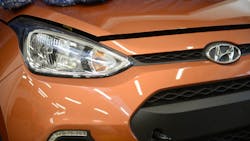At a factory in northern China making Hyundai cars, employees aren’t sure from one day to the next whether their workplace will be open. Chinese buyers are shunning the automaker because of political tensions over a missile-defense system, with sales plunging 64% in the aftermath.
The plant in Cangzhou closed multiple times in the past six months, said a worker who doesn’t want to be identified for fear of losing his job. Assembly lines shut for a week in August, then resumed operations for a day before closing again, he said. Another stoppage occurred this month.
These start-and-stop operations are the new normal for Hyundai Motor Co. in the world’s largest auto market, said Bloomberg Intelligence analyst Steve Man. Hyundai already curtailed production there by two-thirds, and business may get even worse after South Korea added more launchers to the missile system in response to North Korea testing more nuclear weapons despite international condemnation and sanctions.
Dealers in China say they’re losing thousands of yuan on every Hyundai sale because of steep discounts, and some may drop the brand.
“It doesn’t seem like there’s any light at the end of the tunnel,” Man said. Hyundai’s Seoul-listed shares have dropped 6.9% this year, compared with a 17% increase in the benchmark Kospi Index.
The state-controlled Chinese media is piling on, too. The Global Times, a tabloid affiliated with the Communist Party mouthpiece People’s Daily, said local partner BAIC Motor Corp. was fed up with Hyundai’s “greed and arrogance” in resisting proposals to cut costs by using more Chinese suppliers. BAIC declined to comment.
One China-based supplier stopped delivering parts last week for air-intake systems because of delayed payments from the carmaker’s local venture, prompting the Cangzhou plant to halt production temporarily.
Hyundai also is lowering its profile in China. The company ended its sponsorship of the Hyundai China Ladies Open, a golf tournament it had been involved with since 2010, a company spokesman in Seoul said Tuesday.
Hyundai's Multiple Headaches
The China collapse is just one of multiple headaches for South Korea’s biggest automaker. Hyundai’s vehicle sales worldwide fell 6% in August, the sixth consecutive month of decline.
Net income in the second quarter fell 51% to 816.9 billion won, and the company said it expected a tough second half of the year.
S&P Global Ratings on Sept. 8 downgraded its outlooks for Hyundai and affiliate Kia Motors Corp. to negative from stable. Hyundai and Kia “will continue to face profitability pressures over the next 12-24 months because of intense competition and difficulties in its Chinese operations,” the ratings agency said.
Hyundai and Kia are expected to sell a combined 1 million vehicles in China this year -- a plunge of at least 40% from a year earlier, the agency said.
Beijing Hyundai, the joint venture with Beijing-based BAIC, lost 210 billion won (US$186 million) in the first six months of 2017, according to regulatory filings. In the same period a year earlier, the joint venture earned 700 billion won.
Beijing Hyundai sold only 361,000 cars in the first half of this year, a 29% decline from a year earlier -- before the Thaad missile system was installed in South Korea. Revenue fell 52% to 4.57 trillion won.
“Thaad is the trigger leading to the current situation,” said Wang Cun, who runs the committee overseeing imported cars at the China Automobile Dealers Association, a trade group.
The stumble comes even as China’s vehicle sales increased 5.3% in August, according to the China Association of Automobile Manufacturers. The best performers include Geely Automobile Holdings Ltd., which said August sales skyrocketed 80% from the year earlier. Even before the missile crisis, Hyundai struggled to keep pace with local carmakers tapping into customers’ preferences for SUVs.
Soft U.S. Sales
The situation isn’t any better in the U.S., where Hyundai’s August sales plunged 25% from a year earlier, and its market share declined by more than a percentage point to 3.7%.
The spate of bad news has analysts bearish on the company’s full-year performance. Net income is expected to fall 13% this year to 4.68 trillion won, according to the average of 28 analyst estimates compiled by Bloomberg. That average has dipped by 100 billion won in the past four weeks.
“The company may remain mired in a sales slump if auto demand slows in 2018 as projected,” Esther Yim, an analyst with Samsung Securities Co., wrote in a Sept. 8 report.
Hyundai is revamping its China management team, naming a new chief for its operations and hiring a new head of design. The company also remains committed to its partnership with BAIC.
“The cooperative relationships between the two companies will continue, and both plan to continue various talks to strengthen competitiveness in the Chinese market,” Hyundai Motor said in a statement.
Dealer worries are another issue, with one Kia group asking Hyundai China for 800 million yuan (US$123 million) in aid because of low sales.
A Beijing-based Hyundai dealer said monthly sales have fallen to 40 cars from about 175 a year ago.
With Hyundai offering steep discounts, he’s losing 10,000 yuan on every sale, the dealer said, asking not to be named for fear of reprisal from the company. Now he’s considering abandoning Hyundai altogether to focus on non-Korean brands.
Bloomberg’s Man said that movement could spread.
“If they’re not making money, they may just switch,” he said. “If this thing drags out any longer, it’s highly likely that will happen.”
By Bloomberg News
About the Author
Bloomberg
Licensed content from Bloomberg, copyright 2016.
